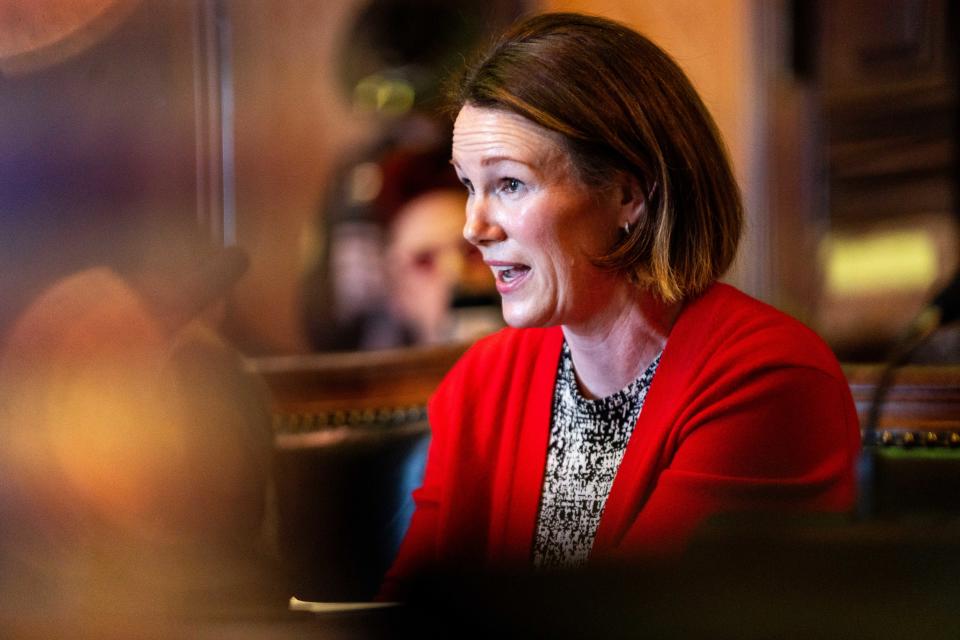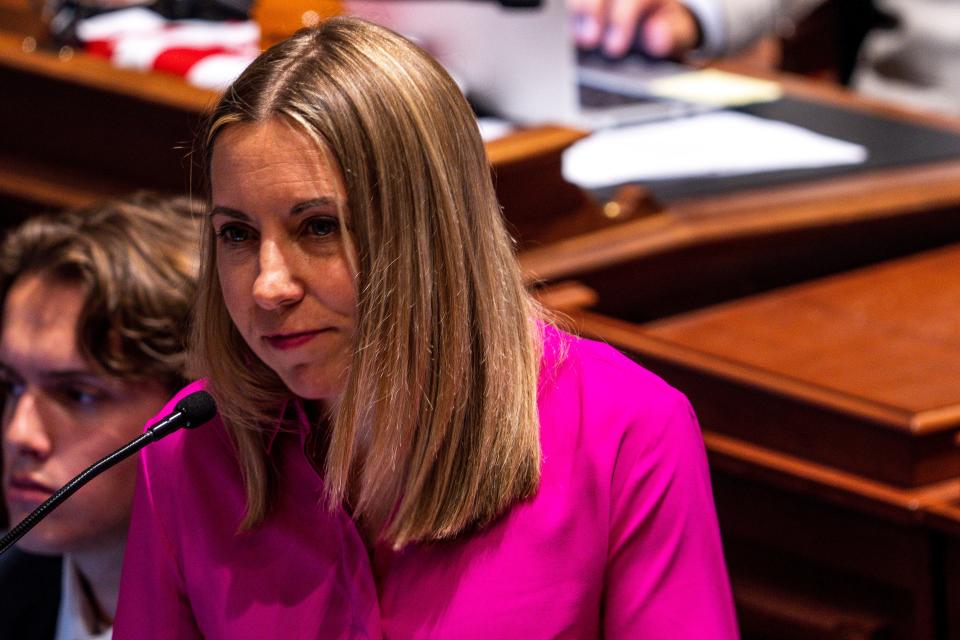Kim Reynolds has released her plan to restructure Iowa's mental health systems. Here's what it says:
- Oops!Something went wrong.Please try again later.
Gov. Kim Reynolds' plan to overhaul Iowa's "fractured" mental health and disability service systems is advancing at the Iowa Capitol.
The 80-page bill, introduced to the legislature last week, lays out the Republican governor's plan to reshape mental health and substance use treatment services offered in Iowa, merging 32 local regions into seven new "unified districts."
House Study Bill 653 would also move disability services currently overseen by those local regions, instead shifting that management to the Iowa Department of Health and Human Services.
Lawmakers and state officials have described the new proposal as the next step in Reynolds' massive reorganization of state government signed into law last year.
The proposed legislation “has much to do with our reorganization as well as our continued momentum in wanting to make the best mental health and disability services available for all Iowans," said Rep. Joel Fry, R-Osceola, said during a House subcommittee hearing last week.
With Iowa agencies officially consolidated and in effect, Iowa Department of Health and Human Services Director Kelly Garcia said that focus has now shifted to the arms of the agency that manage the array of services offered by the state of Iowa.
The plan was advanced through committee Wednesday and awaits floor debate in the House, having survived the first "funnel" deadline of session.
Why does Kim Reynolds want to overhaul Iowa's mental health system?
The governor's office, HHS and other supporters of the bill say the consolidation effort is a necessary step to address issues within Iowa's current system, which they say separates substance use treatments and mental health services.
Services are not consistent across the current system, creating gaps in Iowans' ability to access the care they need, said Molly Severn, legislative liaison and deputy chief of staff for Reynolds’ office during last week's House subcommittee hearing. As a result, Iowans are not able to access behavioral health services "where they live and when they need them," she said.
With this shift, officials can establish "a truly integrated equitable system of behavioral health care for the first time," Iowa HHS spokesperson Alex Murphy said in a statement.
"Right now, the way Mental Health and Disability Services regions are structured, Iowans have to know which region they reside in, which services are funded in their region and who the service providers are," Murphy said. "The newly aligned system will be well coordinated with clear access points so Iowans can receive the same behavioral health services across the state no matter where they live."
Both the House and Senate versions of the bill have passed committee vote and are eligible for full debate before both chambers.
Sen. Jeff Edler, R-State Center, who chaired the subcommittee on the Senate version of the legislation, Senate File 2354, said he supports moving the bill forward, although he expects lawmakers to offer an amendment when it comes before the full Senate.
"I would like to say thank you also. This has been a continuation of an ongoing journey and we’ve got to keep moving forward to close those gaps," he said.
More: Gov. Kim Reynolds pitches consolidation plan to improve mental health access in Iowa
How would this proposal change mental health, substance use services in Iowa?
Currently, Iowa has 13 Mental Health and Disability Service regions that oversee mental health and disability services, as well as 19 Integrated Provider Networks that manage substance use and problem gambling services.
Reynolds' proposal would dissolve this system, instead establishing a new Behavioral Health Service System made up of seven districts to oversee services for those with mental health conditions and substance use disorders.
“25 percent of adults with serious mental health challenges also suffer from substance use disorder," Reynolds said in a statement. "But right now, the system is fractured — preventing Iowans from getting the support they need. By aligning these 32 separate regions into a unified seven, we can improve coordination of services and deliver better treatment for Iowans.”
The governor's proposal outlines the new system's duties, including prevention services; "evidence-based" early intervention and treatment; support services designed to avoid needing acute care or law enforcement; and crisis services focused on de-escalation.
HHS would be tasked with maintaining a central data repository to track the new system and its impacts, and to use that data to track behavioral health needs, develop policies and "otherwise perform acts as necessary to enhance the state's overall behavioral health."
Who would oversee Iowa's new behavioral health districts?
The new bill directs HHS to hire an administrative services organization, or ASO, to oversee each of the seven districts and its service array.
“As we move forward, our administrative service organization structure is key," Garcia said. "That's the accountability mechanism. It's also the space where we ensure that that local input is there.”

These ASOs could come in the form of a dedicated "regional administrator" or a public or private agency already operating within the bounds of the new health district. HHS would seek proposals for potential candidates for those organizational roles.
"The contracts with these entities will have a budget and a measurable outcome and performance measures," Severn told lawmakers.
The new districts' boundaries would be determined based on city and county lines, areas of high need, population and the patterns of those populations when seeking and receiving care, according to the bill.
Each district would also have a nine-person "advisory council," the members of which would be appointed by the ASO. The council would be made up of:
Three elected officials.
Three behavioral health care providers.
Three individuals receiving behavioral health services or with lived experience.
These advisory boards will establish individualized behavioral health plan for their district based on local need, Severn said, adding that maintaining local autonomy in establishing these core services is a critical part the new proposal.
More: Kim Reynolds proposes in annual speech to boost Iowa teacher pay, overhaul AEAs, cut taxes
How would these districts be funded?
HHS would allocate funding to each of the seven districts through a "behavioral health fund," which would function similar to a block grant, state officials have said.
Dollars to that fund would come from the state's general budget, and would be calculated using the state's total population.
Currently, Mental Health and Disability Service regions relies on state funding, but spending is determined by local governing boards. As a result, spending decisions on services to Iowans is not consistent across the state, leading to gaps for patients and providers, Severn said.
The state estimates the regions have $23 million unspent dollars in its incentive fund balance, “despite there being a growing need for behavioral health services, with millions more projected over the coming year," Severn said.
More: Iowa worst in the nation for state psychiatric beds, report says. How a new plan may help
What happens to disability services?
Under the proposal, disability services currently provided by Iowa's 13 Mental Health and Disability Service regions would be shifted to the state’s Aging and Disability Services under Iowa HHS.
The agency is directed to establish a coordinated system of aging and disability resource centers that oversee long-term living or community support services for Iowans with disabilities. According to the bill, that includes those with chronic mental illness, intellectual disability, developmental disability or a brain injury.
When would this transition take place?
The new Behavioral Health Service System will be operational by July 1, 2025.
If the legislation is approved and signed into law, the effort to overhaul the state's mental health and disability service systems would begin July 1 of this year.
How have Iowa's behavioral health districts changed before?
Reynolds' plan this session is not the first time the state has changed how behavioral health services are managed in Iowa.
Services were controlled on a county-by-county basis until 2014, when they were consolidated into 32 local regions that serve as the current system. Nineteen of those regions are dedicated to substance use services and 13 provide mental health services.
Dollars for that system were funded by county property taxes and managed by regional authority until 2021, when Reynolds signed a sweeping tax law that eliminated that property tax levy and instead shifted mental health funding to the state's general fund.
What have Republicans and Democrats said about the plan?
Republicans have praised the proposal to overhaul the state's mental health and substance use service system, saying the latest legislation continues after years of effort at Iowa's highest offices to improve access to behavioral health treatment.
“There's improvement to be made and many opportunities to be gained, but by and large, we are listening to what Iowans are needing and we look forward to how this bill will also help complement the next step of our mental health and disability service system," Fry said.
Rep. Ann Meyer, R-Fort Dodge, echoed those comments during the House subcommittee hearing, saying she believes the legislation "is a great change."
“I know in my district we have people that are not having their needs met and I’m looking forward to closing the gaps," Meyer said.
Democrats so far have been more cautious in signing on to this effort, saying they still had lingering questions about this proposed overhaul.
“It’s a big move," said Rep. Beth Wessel-Kroeschell, D-Ames. "I think there’s lots of good things in here, but I do have some questions on some of this stuff, so at this time, I’m going to join the undecided group and continue to work on it.”
Sen. Sarah Trone Garriott, D-West Des Moines, asked Garcia if the new plan would allow counties to continue some of the collaborations they're doing now. She raised concerns that counties would lack a voice in determining services under an ASO.
"Do you have any plans to help make sure that all those counties have full representation, that they’re going to have a voice, that we’re not going to lose services that we’re currently providing when the transition happens?"

Garcia said the plan is still a draft and is intended to ensure that local partnerships can continue if they're working well.
"Maps are tricky because folks hone in on this being a boundary and a demarcation or catchment area, but a reminder that in this new system there really aren’t barriers or walls, it’s really more about collaboration," she said.
Stephen Gruber-Miller contributed to this report.
Michaela Ramm covers health care for the Des Moines Register. She can be reached at mramm@registermedia.com, at (319) 339-7354 or on Twitter at @Michaela_Ramm
Galen Bacharier covers politics for the Register. Reach him at gbacharier@registermedia.com or (573) 219-7440, and follow him on Twitter @galenbacharier.
This article originally appeared on Des Moines Register: Gov. Kim Reynolds' bill to overhaul Iowa's mental health system

